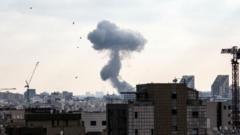Families express a mix of support and worry, highlighting the emotional toll of military life amid escalating geopolitical tensions.
**Military Families Grapple with Tensions After Strikes in Iran**

**Military Families Grapple with Tensions After Strikes in Iran**
Tensions rise among military families as airstrikes in Iran raise concerns for active service members’ safety.
In the wake of recent military actions, families and friends of service members are experiencing a tumultuous swirl of emotions. Over the weekend at Fort Benning in Georgia, a gathering celebrated Army enlistees completing their basic training, while simultaneously absorbing the news of airstrikes launched by President Trump against three nuclear sites in Iran.
For many attending, the recent events offered a stark reminder of the inherent risks associated with military life. Michele Bixby, a 24-year-old from upstate New York, shared her anxiety about her brother's future in the service. “People can lose their life, so I’m worried,” she expressed, yet acknowledged her brother’s determination to pursue his passion despite current events.
As communities near military bases react to these developments, responses diverge from staunch support of the airstrikes to vociferous dissent. However, a universal sentiment emerged during discussions—deep concern for the well-being of American troops stationed both at home and abroad.
In light of the airstrikes and Iran's promise of retaliation, unease surrounds the more than 40,000 U.S. military personnel and civilians stationed in the Middle East, rumored to potentially face increased threats. Secretary of Defense Pete Hegseth reassured the public of the administration’s intention to avoid an extended conflict, yet the looming uncertainty remains palpable.
Members of military families, including Meghan Gilles, a 37-year-old who serves in the Army Reserve at Fort Campbell in Kentucky, acknowledge the gravity of the situation. “A lot of the families around here are quickly realizing this is a real threat; this is something we need to be worried about,” she noted, illustrating a deep-seated worry that resonates within military circles.
As the situation evolves, the emotional toll on military families remains high, navigating the dual realities of pride in their loved ones’ service and fear for their safety.
For many attending, the recent events offered a stark reminder of the inherent risks associated with military life. Michele Bixby, a 24-year-old from upstate New York, shared her anxiety about her brother's future in the service. “People can lose their life, so I’m worried,” she expressed, yet acknowledged her brother’s determination to pursue his passion despite current events.
As communities near military bases react to these developments, responses diverge from staunch support of the airstrikes to vociferous dissent. However, a universal sentiment emerged during discussions—deep concern for the well-being of American troops stationed both at home and abroad.
In light of the airstrikes and Iran's promise of retaliation, unease surrounds the more than 40,000 U.S. military personnel and civilians stationed in the Middle East, rumored to potentially face increased threats. Secretary of Defense Pete Hegseth reassured the public of the administration’s intention to avoid an extended conflict, yet the looming uncertainty remains palpable.
Members of military families, including Meghan Gilles, a 37-year-old who serves in the Army Reserve at Fort Campbell in Kentucky, acknowledge the gravity of the situation. “A lot of the families around here are quickly realizing this is a real threat; this is something we need to be worried about,” she noted, illustrating a deep-seated worry that resonates within military circles.
As the situation evolves, the emotional toll on military families remains high, navigating the dual realities of pride in their loved ones’ service and fear for their safety.





















